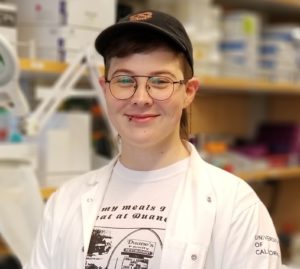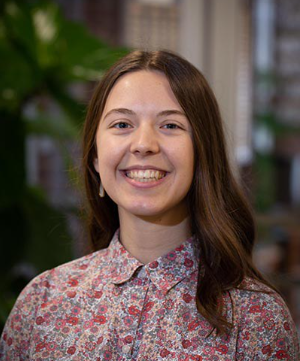Two Allegheny College Graduates Awarded 2022 National Science Foundation Graduate Research Fellowships
Allegheny College alumni Kris Troy ’16 and Bella Petitta ’21 were awarded the prestigious National Science Foundation (NSF) Graduate Research Fellowship.
The fellowship winners are provided with an annual stipend, a cost-of-education allowance of $12,000 to their graduate institution, and additional funding to support research. Previous awardees have gone onto distinguished careers as professors or researchers.
Kris Troy is a 2016 Allegheny graduate who majored in biology with a minor in art. They currently study quantitative and systems biology at the University of California, Merced. After graduation, they plan on becoming a professor at a small liberal arts college.
Bella Petitta is a 2021 Allegheny graduate who majored in environmental science and sustainability with minors in biology and psychology. She is currently working at Pennsylvania State University as a research technician, managing a lab’s collection of wild bees as part of a statewide monitoring program. Next fall, she will be transitioning into a master’s program at State College in ecology, where she will continue to work on a project in collaboration with the Pennsylvania Department of Conservation and Natural Resources (DCNR).

As a child, Troy saw how biology could be used to help others. Troy’s original proposal for the NSF award involved epigenetics, the regulation of gene expression, which is often related to certain diseases like cancer. Eventually, Troy changed their proposal as they began to study discipline-based education research (DBER), which is the science of how best to teach field-specific topics to undergraduates.
Troy’s current study explores how to teach undergraduate students complicated concepts like epigenetics and molecular biology. They’re most passionate about how to make biology topics that were once barred from excluded populations more accessible to include diverse viewpoints.
“Anybody can be a great scientist,” Troy says. “Just because you don’t come from the conventional background of what we expect scientists to look like does not mean you cannot achieve at an extremely high level.”
Troy credits Allegheny for laying a foundation with superb student-faculty research.
“Freshman Seminar Biology 201 at Allegheny College is already some of the best education we could get,” Troy says, “Whereas at bigger schools oftentimes undergraduates don’t have any experience doing their own experiments until after they graduate.”
Additionally, Troy values the College’s major-minor combination for expanding their knowledge outside their major.
“I could do everything and get a lot of experience in a lot of different fields, at a bigger school that would’ve not been embraced,” Troy says. “I would’ve been told not to do art in another school and having the minor has been extremely useful for data visualization, teaching students, and I have an understanding of how colors work together for professional purposes.”
Professor of Biology Ron Mumme notes that Troy was interested in everything as an undergraduate.
“They had an agile, natural curiosity about almost every aspect of biology and could get up to speed on almost any topic really quickly,” Mumme says.

Petitta’s research proposal for the NSF award suggested a study investigating the effects of supplemental feeding on the fitness of resource generalist and specialist species using bees.
She applauds Allegheny College’s Creek Connections environmental education program for developing her skills as an ecologist, educator, and community member.
“The collaborative education and experience that I had at Allegheny helped me write a strong proposal highlighting the significance and broader impacts of my proposed research,” Petitta says. “At Allegheny, I was interested in wild bee ecology and pursued independent studies along with my senior thesis to learn more about the wild bee populations in Crawford County under the guidance of Beth Choate.”
Petitta is an exceptional researcher and collaborator, says Associate Professor of Environmental Science and Sustainability Beth Choate.
“I am so proud of Bella, during her time at Allegheny and post-graduation,” Choate says. “During her time working in my lab, she taught herself to identify bees to species and dedicated numerous hours to her research.”
Senior Assistant Dean for Fellowship and Pre-Professional Advising Patrick Jackson says the renowned National Science Foundation Graduate Research Fellowship opens doors to federal and international research possibilities.
“I expect that Kris and Isabella will be no exceptions,” Jackson says. “Early support from a big-time supporter of scientific discovery and innovation like the NSF gives them a head start vis-a-vis the rest of their cohort. Their success further makes clear that Allegheny is training undergraduate students to do scientific research of the highest order.”
Visit Undergraduate Research, Scholarship, and Creative Activities website to learn more about the student-faculty collaboration opportunities that Allegheny College offers.